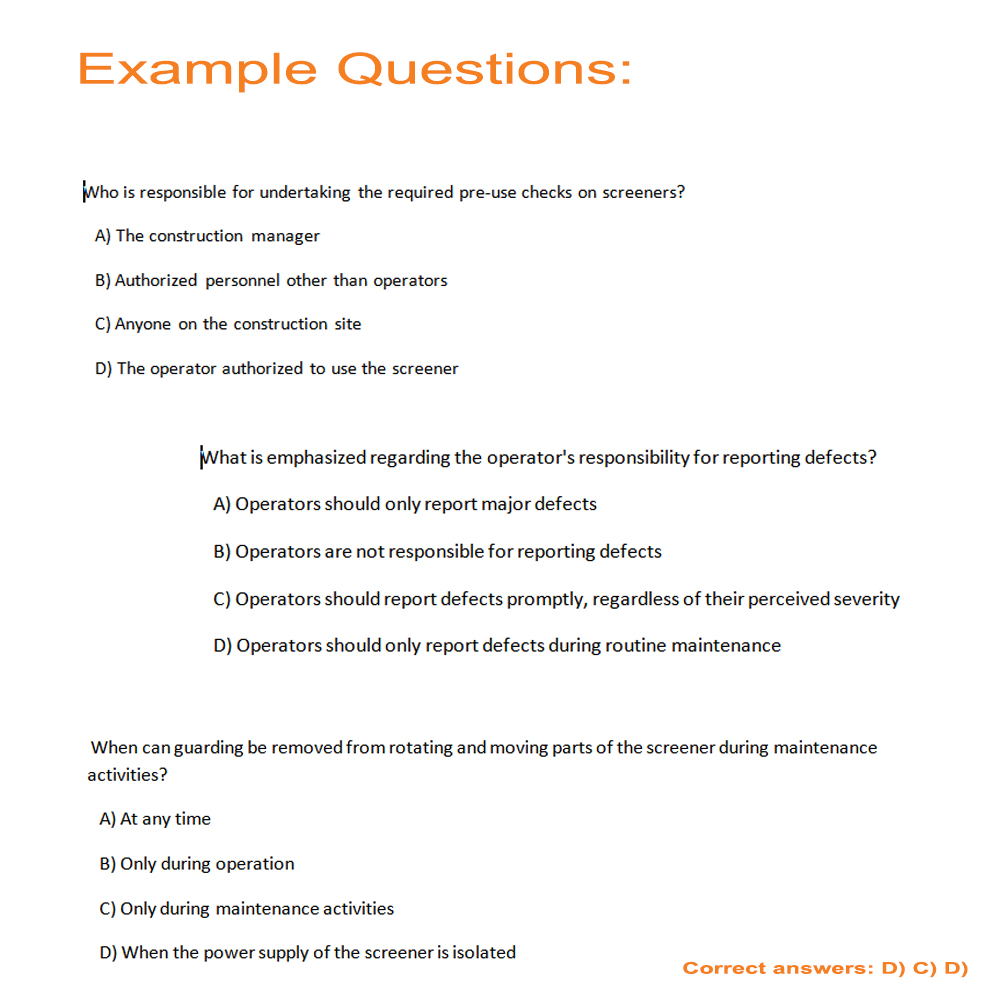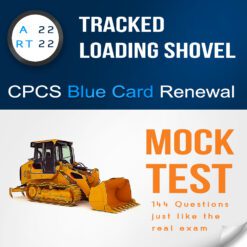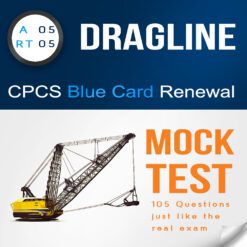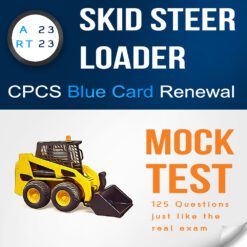RT43 CPCS Blue Card Renewal Mock Test with 102 Questions and Answers / A43 Screener
£15.00 Original price was: £15.00.£9.95Current price is: £9.95.
100% PASS your RT43 CPCS blue card renewal test with practice multiple choice questions – Just like the real NOCN/CPCS test!
- Questions & Answers: based on the latest RT 43 – CPCS Screener Renewal Test Revision FACTSHEET
- Category: A 43 – Screener
- Number of Multiple-choice Questions: 102
- Format: PDF
- Delivery time: Instant download after checkout
- Refunds: No refunds once downloaded, unless you ordered duplicates by mistake.
If there are any issues with your download, please email CardRenewalTest@gmail.com and we’ll send it ASAP
Unlock Your Success with A43 Screener CPCS Blue Card Renewal Mock Practice Test
Are you a dedicated Screener Operator aiming to renew your CPCS Blue Card? Your path to success starts here! We understand the importance of staying up-to-date and well-prepared for your CPCS Blue Card Renewal, and that’s why we’ve created a comprehensive RT43 Screener CPCS Blue Card Renewal Mock Practice Test just for you.
The Power of Preparation
When it comes to renewing your CPCS Blue Card for Screener operations, thorough preparation is the key. Our mock practice test is designed to help you maximize your chances of passing the real RT43 renewal test. It’s not just a test; it’s your gateway to a renewed career and countless opportunities in the construction industry.
Why You Need Our Mock Practice Test:
- Stay Updated: The construction industry evolves, and so do the standards. Our practice test is based on the latest NOCN CPCS RT43 Screener factsheet, ensuring you have the most current information at your fingertips.
- Boost Confidence: Confidence is the cornerstone of success. By practicing with our mock test, you’ll build confidence in your knowledge and abilities, making the actual renewal test less daunting.
- Enhance Your Knowledge: Our practice test covers a wide range of topics, including maintenance, safety procedures, clearing blockages, and more. You’ll gain in-depth knowledge that’s not only valuable for your renewal but also enhances your skills as a Screener Operator.
- Identify Weaknesses: Our practice test allows you to pinpoint areas where you may need improvement. This targeted approach to learning ensures you focus your efforts where they matter most.
- Familiarize Yourself: Become familiar with the format and types of questions you’ll encounter in the real RT43 renewal test. No surprises on test day!
- Save Time and Money: Preparing for the CPCS Blue Card Renewal can be time-consuming and costly. Our mock practice test offers an affordable and efficient way to get ready.
- Increase Success Rate: Studies have shown that practice tests significantly increase the chances of passing the actual exam. Don’t leave your career to chance—prepare to succeed.
What You’ll Learn:
- Maintenance and Clearing Blockages: Understand the correct procedures for maintenance and clearing stalled or blocked screeners. Safety is paramount in this field, and our practice test reinforces this critical knowledge.
- Working Safely: Learn about the importance of working safely, including safety measures, precautions, and procedures to follow. Safety isn’t just a requirement; it’s a mindset.
- Screening Operations: Dive into the specifics of screening operations, including material jamming, safety measures, and the impact of working on sloping ground.
Secure Your Future Today
Renewing your CPCS Blue Card for Screener operations is a pivotal moment in your career. Don’t leave it to chance. Our RT43 Screener CPCS Blue Card Renewal Mock Practice Test is your comprehensive tool for success. Prepare, practice, and pass with confidence.
Secure your future in the construction industry by investing in your knowledge and expertise. With our mock practice test, you’ll not only renew your CPCS Blue Card but also bolster your skills, ensuring a successful and prosperous career ahead.
Are you ready to take the first step toward securing your career as a Screener Operator? Don’t wait until the last minute to prepare for your CPCS Blue Card Renewal. Start today with our mock practice test, and watch your confidence and success soar.
Renew your CPCS Blue Card with ease and confidence. Get started now!
Remember, success is just a click away. Get started with our RT43 Screener CPCS Blue Card Renewal Mock Practice Test today!
Here is a summary of the key learning points from the RT43 Screener factsheet:
Preparation and Completing Work:
- Screeners in Construction: Screeners are essential machines in construction-related activities such as demolition and clearance work. They can be fed by crushers or other equipment and are commonly used in the aggregate processing sector.
- Team Collaboration: Screening operations often involve a team of operators, including screener operators and loading personnel. Some may also be involved in crushing processes.
- Safety Emphasis: The factsheet highlights that incidents and accidents can occur with screeners, emphasizing the importance of following good working practices.
- Pre-Use Checks: Proper pre-use checks are crucial for safe operation. Operators must perform these checks at specified intervals to ensure the equipment’s safety and performance.
- Manufacturer’s Guidance: Checks and inspections are outlined in the operator’s manual, with the frequency determined by the manufacturer. Extreme or unusual conditions may require more frequent checks.
- Emergency Shutdown: Daily running checks, including emergency shutdown or stop button functionality, are vital. Operators must immediately report any defects, no matter how minor.
- Method Statement: A method statement should be developed, addressing factors like risk identification, dust control, PPE, sequence of work, personnel involved, and procedures for clearing blockages.
- Communication and Training: All personnel involved in screening operations should be informed of the method statement’s contents and their respective roles. Changes in conditions should be addressed by authorized personnel.
- Safety During Maintenance: Those conducting maintenance with remote-controlled pendants must ensure the power supply and remote pendant are isolated before performing checks or inspections.
- Movement Safety: Self-propelled screeners used in construction should have their components raised, folded, or secured before movement. Hazards such as poor ground, overhead obstacles, and other plant and personnel movement should be checked.
- Operator Safety: Operators should avoid standing between a moving screener and structures or objects while traveling to prevent potential entrapment or crushing accidents.
Working Safely and with Others:
- Danger Zone Awareness: The area around a screening operation is considered a danger zone. Operators and supporting personnel have been struck by loading machine buckets while on access platforms.
- Platform Safety: Guidance from the Health and Safety Executive advises against being on a working platform once feed or discharge rates have been set and checked to prevent accidents.
- Loading Shovel Safety: When a screener is fed by a loading shovel, the loading ramp’s incline should not exceed 1 in 10, and discharge should be done on level ground to maintain the operator’s vision and control.
- Communication and Safety: Effective communication and agreed-upon signals or instructions should be established with loading plant operators before work begins.
- Slips and Trips: Processed materials and overspill can accumulate, leading to slip hazards. Adequate foot grip and precautions are essential, especially on dusty platforms.
- Working at Height: When accessing any part of the screener during pre-start checks, setup, or blockage handling, working at height requirements should be considered, and restraint harnesses may be necessary.
- Environmental Impact: Screening operations near public areas can generate excessive noise and dust. Measures such as shielding can be employed to mitigate these effects.
Maintenance and Clearing Blockages:
- Clearing Blockages: Clearing blocked or stalled screeners can be hazardous, making correct procedures vital. Material jamming in the screening chamber is one potential cause of stalling.
- Permit to Work: Before clearing a stalled or blocked screener, a permit to work procedure must be developed and followed. This includes shutting down the engine/power supply and ensuring all rotating components have stopped.
- Guarding Safety: All rotating and moving parts should be adequately guarded to prevent contact with personnel. Guarding can only be removed during maintenance activities by trained personnel when the power supply is isolated.
- Level Surface Operation: Screeners are designed to operate on level surfaces. Operating on sloping ground may impact the screening process, affecting desired settings or grades.
These learning points provide valuable insights into safe and efficient screener operation, maintenance, and overall best practices in the construction industry.
2 reviews for RT43 CPCS Blue Card Renewal Mock Test with 102 Questions and Answers / A43 Screener
Add a review Cancel reply
Related products
CPCS Blue Card Renewal Tests
RT60 CPCS Blue Card Renewal Mock Test with 151 Questions and Answers / A60 Mobile Crane
CPCS Blue Card Renewal Tests
RT42 CPCS Blue Card Renewal Mock Test with 117 Questions and Answers / A42 Crusher
CPCS Blue Card Renewal Tests
RT49 CPCS Blue Card Renewal Mock Test with 141 Questions and Answers / A49 Loader Securer non STGO
CPCS Blue Card Renewal Tests
RT22 CPCS Blue Card Renewal Mock Test with 144 Questions and Answers / A22 Tracked Loading Shovel
CPCS Blue Card Renewal Tests
CPCS Blue Card Renewal Tests
RT05 CPCS Blue Card Renewal Mock Test with 105 Questions and Answers / A05 Dragline
CPCS Blue Card Renewal Tests
RT23 CPCS Blue Card Renewal Mock Test with 125 Questions and Answers / A23 Skid Steer Loader
CPCS Blue Card Renewal Tests
RT17 CPCS Blue Card Renewal Mock Test with 144 Questions and Answers / A17 Telescopic Handler

















Emily Worthington –
The mock test is alright, I guess. Nothing too crazy, just your average run-of-the-mill questions.
Sebastian –
I’ve struggld to find anything liek this. Really glad I came accross this gave me a nice preview of the screener test